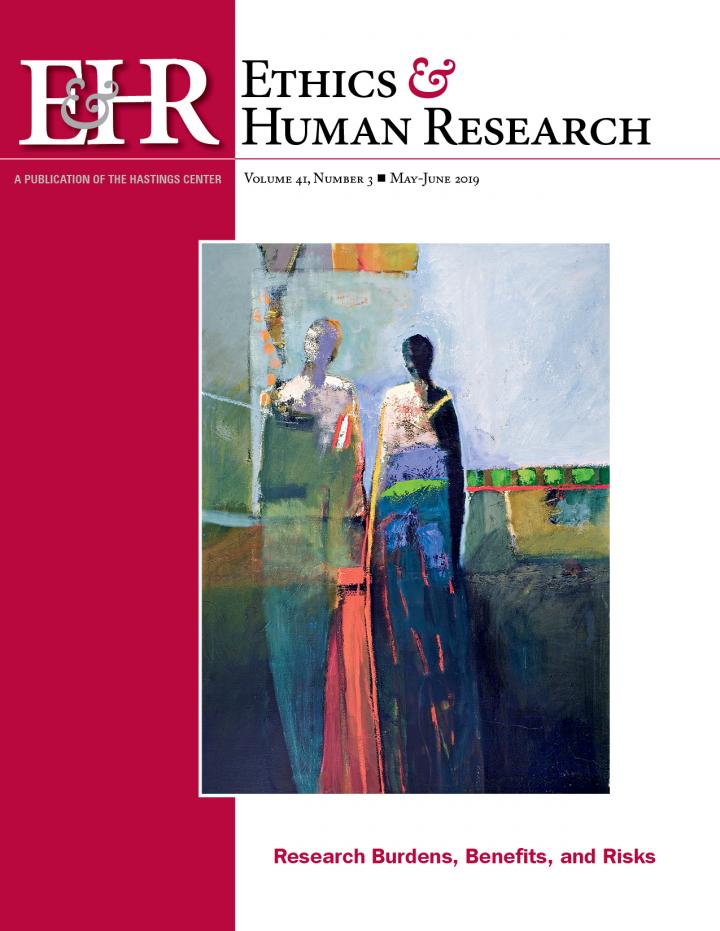Parent experiences when approached for research in a pediatric intensive care unit, the role of inclusion benefits in ethics committee assessment of research, and more in the current issue

Credit: In the Mirror, by Kathy Jones, 48 x 36 inches, oil on canvas.
Courtesy of the artist. www.kathyjonesstudio.com
Burden or Opportunity? Parent Experiences When Approached for Research in a Pediatric Intensive Care Unit
Erin Paquette, Avani Shukla, Jacob Davidson, Karen Rychlik, and Matthew Davis
There’s an ongoing need for more pediatric research, and low enrollment may impede the completion of many studies, particularly in critical care. This article reports on a study that explored the factors that parents weighed in deciding whether to enroll their critically ill children in research. Parents were motivated to enroll their children when the research was low risk and could help future children, among other reasons. Barriers to enrollment included risks to their children, feeling overwhelmed, and poor explanation of the research. Erin Paquette is an assistant professor of pediatrics at Northwestern University Feinberg School of Medicine; Avani Shukla is a research assistant at the Ann & Robert H. Lurie Children’s Hospital of Chicago; Jacob Davidson is a medical student and research assistant at Northwestern University Feinberg School of Medicine; Karen Rychlik is a senior statistician at the Ann & Robert H. Lurie Children’s Hospital of Chicago; and Matthew Davis is a professor and the vice chair of the Department of Pediatrics at Northwestern University Feinberg School of Medicine.
The Role of Inclusion Benefits in Ethics Committee Assessment of Research Studies
Stuart Rennie, Suzanne Day, Allison Mathews, Adam Gilbertson, Winfred K. Luseno, Joseph D. Tucker, and Gail E. Henderson
For a research study to be ethical, its benefits should outweigh its risks. But inclusion benefits–benefits offered to participants, such as access to improved health care or increased knowledge about their condition–are often overlooked by research ethics committees in their risk-benefit assessments of a study. The authors argue that ethics committees should take inclusion benefits into account and that their significance should be made explicit, particularly when the research is high risk. Stuart Rennie is an associate professor in the Department of Social Medicine at the Center for Bioethics at the University of North Carolina at Chapel Hill; Suzanne Day, Allison Mathews, and Adam Gilbertson are postdoctoral researchers in the Department of Social Medicine and the Institute for Global Health and Infectious Diseases at the University of North Carolina at Chapel Hill; Winfred K. Luseno is a research scientist at the Pacific Institute for Research and Evaluation; Joseph D. Tucker is an associate professor at the Institute for Global Health and Infectious Diseases at the University of North Carolina at Chapel Hill; and Gail E. Henderson is a professor in the Department of Social Medicine at the University of North Carolina at Chapel Hill.
Also in this issue:
- Implementing a Central IRB Model in a Multicenter Research Network
- Commentary: Scientific Merit Predicates Ethical Review of Clinical Research
- Commentary: Strength through Structure: Defending a Structure Approach to Contraceptive Mandates in Clinical Research
- Commentary: The Guatemalan Syphilis Trials, Community Engagement, and the Common Rule
- Book Review: The Trust Principle and Research Ethics
###
For more information, contact
Susan Gilbert
Director of Communications
The Hastings Center
[email protected]
845-424-4040 x 244
Media Contact
Susan Gilbert
[email protected]




